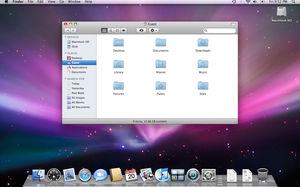Mac OS 10.5
| A version of the macOS operating system | |
 |
|

|
|
| Developer | Apple Inc. |
|---|---|
| OS family | |
| Source model | Closed source (with open source components) |
| Released to manufacturing |
October 26, 2007 |
| Latest release | 10.5.8 (Build 9L31a) / August 13, 2009 |
| Update method | Apple Software Update |
| Platforms | IA-32, x86-64, PowerPC |
| Kernel type | Hybrid (XNU) |
| License | Commercial proprietary software with Apple Public Source License (APSL) |
| Preceded by | Mac OS X 10.4 Tiger |
| Succeeded by | Mac OS X 10.6 Snow Leopard |
| Official website | Apple - Mac OS X Leopard at the Wayback Machine (archived May 28, 2009) |
| Support status | |
| Unsupported as of about June 23, 2011 | |
Mac OS X Leopard (version 10.5) is the sixth major release of Mac OS X (now named macOS), Apple's desktop and server operating system for Macintosh computers. Leopard was released on October 26, 2007 as the successor of Tiger (version 10.4), and is available in two editions: a desktop version suitable for personal computers, and a server version, Mac OS X Server. It retailed for $129 for the desktop version and $499 for Server. Leopard was superseded by Snow Leopard (version 10.6). Leopard is the final version of Mac OS X to support the PowerPC architecture as Snow Leopard functions solely on Intel based Macs.
According to Apple, Leopard contains over 300 changes and enhancements over its predecessor, Mac OS X Tiger, covering core operating system components as well as included applications and developer tools. Leopard introduces a significantly revised desktop, with a redesigned Dock, Stacks, a semitransparent menu bar, and an updated Finder that incorporates the Cover Flow visual navigation interface first seen in iTunes. Other notable features include support for writing 64-bit graphical user interface applications, an automated backup utility called Time Machine, support for Spotlight searches across multiple machines, and the inclusion of Front Row and Photo Booth, which were previously included with only some Mac models.
...
Wikipedia
